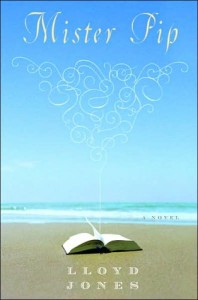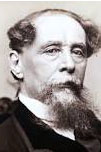What Dickens Knew: The Importance of Character
 2/4/14 WHAT DICKENS KNEW: THE IMPORTANCE OF CHARACTER
2/4/14 WHAT DICKENS KNEW: THE IMPORTANCE OF CHARACTER
Near the beginning of Lloyd Jones’s Mister Pip, there is a delightful moment in which Mr. Watts tells his students that they will soon be meeting Mr. Charles Dickens of London, England. The students rarely see a white man in their isolated village in Papua New Guinea so they come back the next day with great expectations. Initially disappointed to learn the author has been dead for over a century, they quickly become enthralled as Mr. Watts starts reading Dickens’s last novel aloud.
“Now you can say you have met Mr. Dickens on the page, so to speak,” Mr. Watts says after the first chapter. “But you don’t know him yet.”
“When can we say we know Mr. Dickens?” one girl asks.
“Some of you will know Mr. Dickens when we finish the book,” he answers.
It’s a misleading comment. The students won’t get to know Dickens from his novel, though like too many other readers of too many other authors they’ll assume all measure of autobiography in a book that springs from imagination and creativity.
But they will get to know Pip and the other wonderful characters in Dickens’s work, and that proves to be more than enough for them. The characters come to life for the students, especially Matilda, the 13-year-old narrator. Though Matilda’s home is as far away from 19th-century London as any place could be, she sees many similarities in Pip’s background as an orphan, his wish to become something better than he is, and the difficulties of leaving one place for another.
Matilda also becomes engrossed in the story of Great Expectations, though it turns out it’s not Dickens’s story she’s hearing, at least not in all respects. We learn at the end of the book that Mr. Watts has taken liberties with many elements of the book that he thought might be problematic for children who know nothing of the world beyond their tiny village that’s caught in the middle of a civil war in the 1990s. But Mr. Watts doesn’t tamper with the characters; he knows all too well they can’t be improved upon.
As a writer, a frequenter of author readings, and leader of a fiction workshop for teens, I frequently hear authors asked what comes first: the characters or the plot. Every writer has a different answer to that question, but for me a novel always begins with one of the principal characters, whether hero or villain. It’s only when a key character comes to life strutting across the stage that I can figure out what story will best allow him or her to blossom and grow.
As a reader, I have a similar bias. I can’t enjoy a book unless I can connect in some profound way with the key characters. That’s not to say plot doesn’t matter; it’s the vehicle for the character to confront a challenge or make a decision or develop into a better or worse person. But I’ll forgive a mediocre plot if the characters win my interest; the reverse is much less likely.
 Dickens was the master at creating characters. I know a few critics have accused him of leaning on eccentricities and exaggerated traits, but I don’t agree. Or at least it doesn’t bother me. What matters is that each of his characters is so well drawn, with a distinctive voice and personality. Dickens is second only to Shakespeare in having created a long list of unforgettable characters: Ebenezer Scrooge, Tiny Tim, Bob Cratchit, Oliver Twist, Fagin, Bill Sikes, Pip, Miss Havisham, David Copperfield, Charles Darnay, Mr. Micawber, Daniel Quilp, Samuel Pickwick, and Uriah Heep, to name a few.
Dickens was the master at creating characters. I know a few critics have accused him of leaning on eccentricities and exaggerated traits, but I don’t agree. Or at least it doesn’t bother me. What matters is that each of his characters is so well drawn, with a distinctive voice and personality. Dickens is second only to Shakespeare in having created a long list of unforgettable characters: Ebenezer Scrooge, Tiny Tim, Bob Cratchit, Oliver Twist, Fagin, Bill Sikes, Pip, Miss Havisham, David Copperfield, Charles Darnay, Mr. Micawber, Daniel Quilp, Samuel Pickwick, and Uriah Heep, to name a few.
So many other great classics are based on memorable leading men and women: James Joyce’s Leopold and Molly Bloom, Sir Arthur Conan Doyle’s Sherlock Holmes, Vladimir Nabokov’s Humbert Humbert, Edith Wharton’s Lily Bart, Mark Twain’s Tom Sawyer and Huck Finn, J.D. Salinger’s Holden Caulfield, John le Carré’s George Smiley, and Harper Lee’s Atticus Finch.
And it’s not just the classics. Look at today’s best seller list. The Goldfinch wouldn’t hold anyone’s interest for 800 pages if Theo Decker and everyone around him weren’t living, breathing characters. Gillian Flynn’s Gone Girl has a terrific plot but it wouldn’t work without the very strong protagonist and antagonist. And think of all the series featuring strong characters, from Jack Reacher and Lucas Davenport to Harry Potter and Bella Swan. Once the character wins our allegiance, the plot is secondary.
That is also the case in Mister Pip, but with an interesting twist. It’s not only the present-day characters like Mr. Watts and Matilda that grab our attention but also Dickens’s characters who get a second life of sorts in this novel.
So who are your favorite literary characters? List them in the comment section below or send me an email here. I’ll count the votes and let you know the results.
Mark Willen
Mark Willen’s novels, Hawke’s Point, Hawke’s Return, and Hawke’s Discovery, were released by Pen-L Publishing. His short stories have appeared in Corner Club Press, The Rusty Nail. and The Boiler Review. Mark is currently working on his second novel, a thriller set in a fictional town in central Maryland. Mark also writes a blog on practical, everyday ethics, Talking Ethics.com.
- Web |
- More Posts(48)